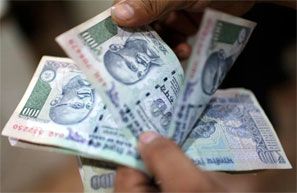 The First Budget of the new Government should aim at restoring domestic savings rate (to at least 35 per cent of GDP in a phased manner) by encouraging domestic financial savings in the economy through focused tax incentives, said CII in its pre-Budget submission to the Ministry of Finance.
The First Budget of the new Government should aim at restoring domestic savings rate (to at least 35 per cent of GDP in a phased manner) by encouraging domestic financial savings in the economy through focused tax incentives, said CII in its pre-Budget submission to the Ministry of Finance.
“In the current phase of economic downturn, any further deterioration in the savings rate would be detrimental and result in greater dependence on foreign capital for investments. The Government should announce concerted measures in the Budget to scale up domestic financial savings through fiscal means, which will help mobilize long-term savings for funding infrastructure and economic development”, said Chandrajit Banerjee, Director General, CII.
Please click here for the Complete Coverage of Budget 2014 -15
Gross domestic savings as a proportion to GDP has declined from a high of 36.8 per cent in 2007-08 to 30.1 per cent in 2012-13. The sharp deterioration in domestic savings could be attributed to a consistent decline in financial savings of households which dropped from 11.6 per cent of GDP to 7.1 per cent during the same period.
Encouraging domestic financial savings through focused measures like increasing the personal income tax slab, removing TDS on interest income to encourage bank deposits, increasing deduction limits for insurance and pensions products, reintroducing tax free infrastructure bonds, promoting investments in Infrastructure Debt Funds, increasing the income ceiling in Rajiv Gandhi Equity Savings Scheme, wider network for marketing inflation indexed bonds and bringing parity between debt and equity products on capital gains tax would scale up the financial savings ratio and help mobilize long term resources for funding infrastructure and economic development, said CII.
To achieve the objective, CII in its submission to the Ministry of Finance has suggested the following key recommendations:
Deduction under Section 80C: At present consolidated deduction of Rs 1 Lakh is allowed on all long term and short term serving instruments including provident fund, pension funds, Equity Linked Savings Scheme etc. It is suggested to increase the limit to Rs 2.5 Lakh.
Deduction in respect of payment of premium under life insurance policies: Section 80C allows deduction up to Rs 1 Lakh in respect of payment of premium under life insurance policies and for other specified payments. The other specified payments include amounts invested in mutual funds, bank deposits, payments towards tuition fees, etc. It is recommended that a separate deduction limit of Rs 1 Lakh is provided for investment in life insurance products.
Deduction in respect of amount paid under pension / annuity plans: As per section 80CCE, the overall ceiling for deduction is Rs 1 Lakh for the payments covered by section 80C, payment towards annuity plans covered by section 80CCC and payment towards NPS covered by section 80CCD. It is recommended to provide for a separate deduction limit for amounts paid to pension funds by way of (a) a separate deduction of Rs 1 Lakh be allowed under section 80CCC instead of covering it under the overall ceiling specified under section 80CCE; and (b) separate deductions provided in section 80C(2)(ii) and 80C(2)(xii) towards deferred annuity / other annuity be shifted to section 80CCC of the Act.
Deduction in respect of health insurance premium: Section 80D allows aggregate deduction of up to Rs 15,000 in respect of payment of health insurance premium and payment made on account of preventive health check-up. It is recommended that the deduction limit under section 80D be increased from Rs 15,000 to Rs 50,000 to further encourage spread and coverage of health insurance.
Deduction on Interest earned on savings bank account: Section 80TTA was introduced in Assessment Year 2013-14 to promote savings by providing for deduction on interest income earned on savings bank account. Currently deduction can be availed up to maximum of Rs 10,000. It is suggested to widen the scope of the Section to include interest earned on time deposits and increase the deduction limit to Rs 25,000.
Deduction in respect of investment in Infrastructure bonds: Deduction under Section 80CCF of the Act should be restored with an increased Investment limit in infrastructure bonds from Rs 20,000 (allowed earlier) to Rs 50,000 for individual / HUF to boost infrastructure development. Private infrastructure companies should also be allowed to issue tax free Infra bonds for various infrastructure activities.
Allowing Infrastructure Debt Funds to issue tax saving bonds: Infrastructure Debt Funds (IDFs) should be permitted to issue tax savings bonds, and such issuances may be limited to a percentage of the net-worth of the IDF. Such tax-savings bonds, which give retail investors a tax exemption on the interest payable to them, would provide an incentive for greater retail participation in IDFs.
Deduction in respect of Rajiv Gandhi Equity Savings Scheme: The Rajiv Gandhi Equity Savings Scheme, a tax saving scheme was announced in the 2012-13 Union Budget aimed at first time retail investors. The scheme is aimed at encouraging the flow of savings of small investors in the domestic capital market, and presents investors with tax benefits provisioned as a new section, 80CCG in the Income Tax Act, 1961. It is recommended to raise the income ceiling to Rs 25 lakh as compared to Rs 12 lakh at present.
Addressing disparity in tax rates between equity and debt products: At present there is a disparity in the tax rates on debt and equity products, which is unfavourable to debt products. Under equity oriented schemes, long-term capital gains tax and dividend distribution tax is nil where as in case of debt oriented funds the corresponding tax rates are 10.3 per cent without indexation (20.6 with indexation) and 28.3 per cent. It is recommended to bring parity between debt and equity products on capital gains and dividend distribution tax.
The above recommended measures would give an impetus in raising the domestic financial savings rate through all major financial investment vehicles including deposits with banks, investments in shares, debentures, mutual funds, life insurance, provident and pension fund, said the CII release.
Please click here for the Complete Coverage of Budget 2014 -15










